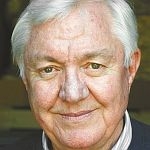 (Host) The bloodletting in Syria continues to confound the international
(Host) The bloodletting in Syria continues to confound the international
community. What America should be doing has also become a presidential
election campaign issue. This morning commentator and veteran ABC News
diplomatic correspondent Barrie Dunsmore offers his analysis.
(Dunsmore)
For 14 months, Syrian President Bashar Assad has shown no mercy in
trying to crush the originally peaceful opposition to the Assad family’s
forty year dictatorship. More than 10,000 Syrians have been killed. The
crisis reached a new level of barbarity last weekend, when according to
a United Nations count, more than 100 people were massacred, including
34 women and 47 children. Most of the victims were shot at close range,
evidently by Assad’s militiamen.
The Syrian uprising began last
year as part of the Arab Spring when peaceful protesters throughout the
Arab world, took to the streets to demand freedom from decades of
oppression. Ultimately the tyrants of Egypt, Libya and Yemen were
overthrown – and America played important roles in those ousters.
Egypt
was a long time ally and substantial recipient of U.S. military aid.
These were factors in the Egyptian military’s crucial decision to remain
neutral in the struggle between protesters and former President Hosni
Mubarak- which hastened his departure.
In Libya, America
organized and directed the NATO bombing campaign that ended with leader
Moammar Kaddafi’s military defeat and death.
But little has been
done, by anyone, to stop the killing in Syria, which continually raises
the question, if military intervention to save lives was okay in Libya,
why not Syria?
These are the answers.
-The military
intervention in Libya had the full support of the U.N. Security Council ,
including Russia and China. The Arab League backed it, as did key
members of NATO who were willing to contribute substantial military
assets.
-The topography of Libya, where the bulk of the
population was spread out on a narrow strip of desert along the
Mediterranean Sea made it ideal for NATO planes to patrol and attack
when Kaddafi’s troops overpowered the rebels.
-The rebels were a mixed bag, but they held territory and their leadership was generally known.
None of these conditions prevails in Syria.
–
China, and especially Russia – a long time supporter of the Assad
family – have blocked any UN resolution that would put significant
outside pressure on the regime.
– As for a bombing campaign:
much of Syria is mountainous and its air defenses are a lot better than
Libya’s. This would make tactical bombing less effective, meaning ground
troops could be necessary.
-The Syrian opposition is highly fragmented and holds no territory. And it is believed to include al Qaeda factions.
–
Also, Syria is a potent mix of Alawites, Shiites, Sunnis and Christians
that could explode into a major sectarian civil war that could well
spread to neighboring countries.
Mitt Romney, the expected
Republican candidate for president, has offered few alternatives, but
predictably has attacked President Barack Obama for what he called a
"policy of paralysis" which had allowed, "the slaughter of 10,000
individuals."
Actually, only Russia has the real power to force
Assad to step down in favor of a Syrian government of national unity.
That would be the most practical way to avoid many more unnecessary
deaths.